How to Reach the 9.0 in IELTS Speaking
Copyright 2017 IELTS Preparation Published by IELTS Preparation at Smashwords Smashwords Edition License Notes This ebook is licensed for your personal enjoymentonly. This ebook may not be re-sold or given away to other people.If you would like to share this book with another person, pleasepurchase an additional copy for each recipient. If youre readingthis book and did not purchase it, or it was not purchased for yourenjoyment only, then please return to Smashwords.com or yourfavorite retailer and purchase your own copy. Thank you forrespecting the hard work of this author. IELTS Medical Academic Speaking Booklet Contents SpeakingExam Criteria How long does the Speaking test last and how many questionsmust be answered? The speaking test has three parts asfollows:
Part 1 (4-5 mins) You answer short questions from the examinerabout yourself and everyday situations.
Part 3 (4-5 mins) You discuss some general but more abstracttopics with the examiner that are related to the Part 2section.
Part 3 (4-5 mins) You discuss some general but more abstracttopics with the examiner that are related to the Part 2section.
What general approach should I take to the Speakingtest? Follow the examiners instructions and listencarefully. Make sure you speak clearly and answer only thequestions that you are asked. The examiner will know if you havememorized answers and you will lose marks for this. How is the Speaking test marked? The Speaking test is marked using a 9-bandscale, like all other parts of the test. The examiner will belistening to four features of your language: fluency and coherence,vocabulary, grammar and accuracy, and pronunciation. 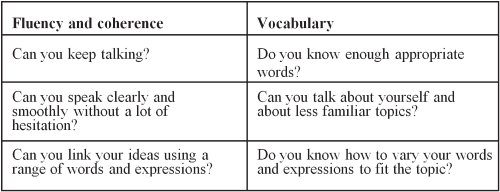
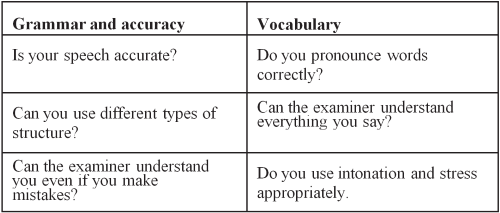 Iseach part of the test marked separately? No, the examiner conducts the test and marksyou according to your performance across all three parts of thetest.
Iseach part of the test marked separately? No, the examiner conducts the test and marksyou according to your performance across all three parts of thetest.
What if Im not sure about the answer? Remember that the speaking test is a languagetest and NOT a test of your views or general knowledge. You can useexpressions that give you some time to think about how you willanswer the question. Lesson 3 How will the test begin? The examiner will ask you to say your nameand ask you where you come from. He or she will then ask to seeyour passport or photo identification. The examiner does not need along reply to the introductory questions, but you should give fullanswers. What topics will the examiner cover? You may get questions on any general,everyday topic, so you need to have some ideas.
Normally theexaminer will ask a few questions on three topics in total and willintroduce each new topic clearly. So once you have answered a fewquestions on one topic, be prepared for a change. Some commons topics include Forms of transport Types of buildings The weather Types of scenery Types of entertainment Hobbies/interests Types of celebration Reading material What sorts of questions will the examiner ask? The questions will be quite easy and will askyou to describe your likes and dislikes, your everyday life, yourplans etc. You may have to talk about the past, present or futureand you may have to give opinions on simple topics. Examples: How often do you go on holiday? How do you prefer to travel when you go onholiday? What do you enjoy doing when youre on holiday? Why do you think people need to go on holiday? Tell me about your last holiday. What if I cant think of anything to say? Remember Part 1 is about you.
Draw on yourown experiences and dont be afraid to express how you feel aboutsomething. How can I improve my accuracy? Listen carefully to the question which willhelp you decide what tense to use and how to form your answer.Heres an example of a past tense question and answer. How old were you when you left school? I was only 15 when I left my high school, but Iwent back to college two years later Lesson4 Part 2 is a short talk which tests yourability to speak continuously for about 2 minutes, to organise yourideas and to speak fluently and cohesively. The examiner will give you a piece of paperand a pen or pencil to make notes, and your topic. You will haveone minute to prepare your talk. What does a Part 2 topic look like? The text will clearly state the topic youneed to talk about and will give some points to guide yourtalk.
Example: Describe a plan you have made for your futurethat is not related to your studies.
You should say:
What the plan is When you think you will do it How it couldchange your life and explain why you have made this plan. What if I dont understand some of the words in thetopic? You can ask the examiner to explain any wordsyou dont understand. How can I make sure I choose a good idea to talkabout? The three points often begin with How or Wh-question words such as why, who, when, whether, what or which.These points are given to help you. Take about one minute to make an idea map, like theone below. What the plan is Buying a guitar Mines 10 years old Its my favourite pastime Theres a model I really like When do you think youll do it Next Year Ill have more time and money next year I need to concentrate on my studies now Ill be 30 next year a special birthday How could it change your life More opportunities Join a band Play better on a new instrument Impress my girlfriend/boyfriend Should I talk about the points in order? You can cover the points in any order.
Youmay have more to say about some points than others. This doesntmatter. What tense should I speak in? This will depend on the instructions. Thetense may change through your talk depending on the points you aregiven. Lesson5 How should I start my talk? Here are some examples: 1) Im going to talk about my first job 2) The person Id like to meet is the president ofour country 3) Id like to talk about the royal wedding that tookplace in Copenhagen in 2004 Taking notes/Creating a mind map 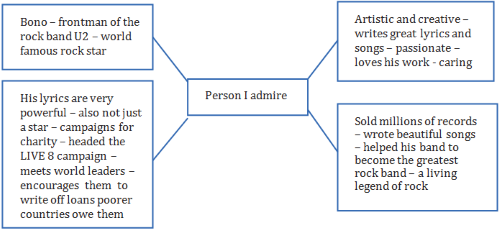 Exam tips Use opening phrases for each new point youmake to give you some time to think. For example based on thequestion and diagram above): Box (i): I admire many people, but I think theperson most worthy of my admiration is Bono Box (ii): Bono has allthe qualities you would look for in a great person.
Exam tips Use opening phrases for each new point youmake to give you some time to think. For example based on thequestion and diagram above): Box (i): I admire many people, but I think theperson most worthy of my admiration is Bono Box (ii): Bono has allthe qualities you would look for in a great person.
He is Box (iii): Bono has done quite an amazing amount inhis life so far; he has Box (iv): The list of reasons why I admire him isvery long; here are just a few Youre not giving any detail when you usethese opening or stock phrases; you are talking in general termsbut staying on-topic. This gives you a chance to order yourthoughts and compose yourself. Stock phrases can also be usedto buy you thinking time when the examiner asks you aquestion. Examples of useful stock phrases include: (i) Thats a difficult question to answer (ii) Interesting question (iii) Thats a very good question (iv) I need to think about this for a moment; hmm,let me see Lesson6 Here are six possible topics that you may have to talk aboutin part 2 of the Speaking exam: A. An activity that you enjoy B. An exciting experience from your childhood C.
A person that you would like to meet D. A celebration that took place in your hometown E. A job that you have done F. A play or concert that you have been in How can I show a range of topic vocabulary? Building phrase banks on some of the mostcommon topics in IELTS will help you achieve a good score on theexam. You can start doing that by selecting a topic and with thehelp of a dictionary or the internet you can add useful words andphrases (chunks) which you can later use. 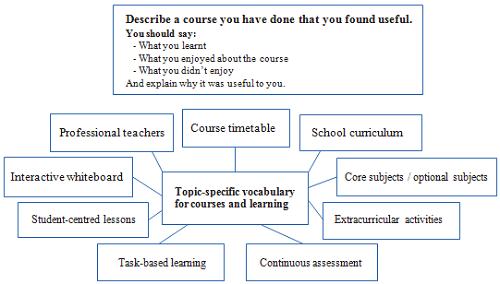




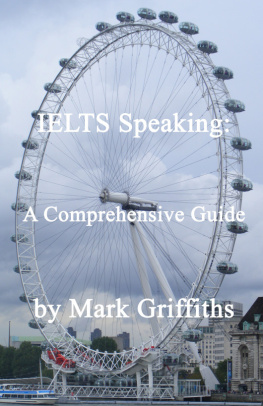
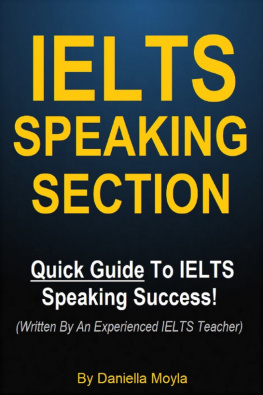
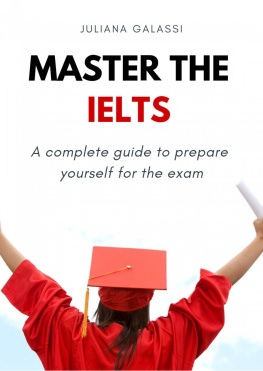

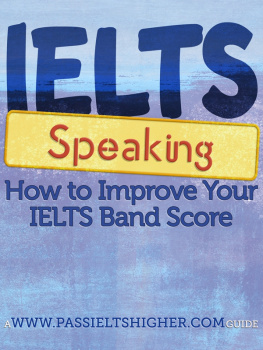
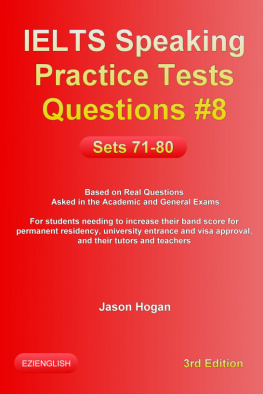


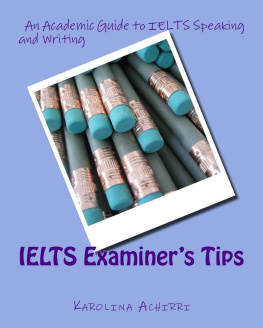
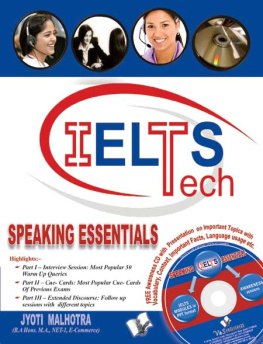

 Iseach part of the test marked separately? No, the examiner conducts the test and marksyou according to your performance across all three parts of thetest.
Iseach part of the test marked separately? No, the examiner conducts the test and marksyou according to your performance across all three parts of thetest. Exam tips Use opening phrases for each new point youmake to give you some time to think. For example based on thequestion and diagram above): Box (i): I admire many people, but I think theperson most worthy of my admiration is Bono Box (ii): Bono has allthe qualities you would look for in a great person.
Exam tips Use opening phrases for each new point youmake to give you some time to think. For example based on thequestion and diagram above): Box (i): I admire many people, but I think theperson most worthy of my admiration is Bono Box (ii): Bono has allthe qualities you would look for in a great person.